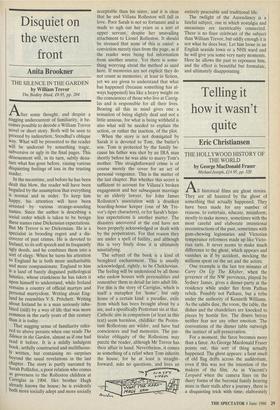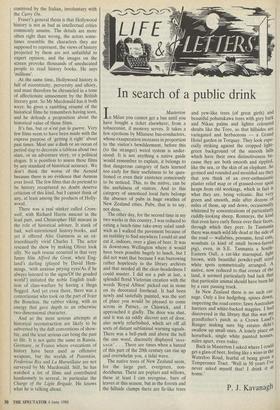Telling it how it wasn't quite
Eric Christiansen
THE HOLLYWOOD HISTORY OF THE WORLD by George MacDonald Fraser
Michael Joseph, f14.95, pp. 320
All historical films are ghost stories. They are all haunted by the ghost of something that actually happened. They have been made for any number of reasons, to entertain, educate, misinform; mostly to make money, sometimes with the most careful and elaborate intentional reconstructions of the past, sometimes with gum-chewing legionaries and Victorian temperance reformers made up like Victo- rian tarts. It never seems to make much difference to the ghost, which appears and vanishes as if by accident, mocking the millions spent on the set and the actors.
One example is the last ten minutes of Carry On Up The Khyber, when the governor of the NW provinces, played by Sydney James, gives a dinner-party at the residency while under fire from Pathan rebels. Possibly not Pathans, but a tribe under the authority of Kenneth Williams. As the sahibs dine, the room, the table, the dishes and the chandeliers are knocked to pieces by hostile fire. The diners betray neither fear nor any other emotion. The conventions of the dinner table outweigh the instinct of self-preservation.
For a moment, the farce becomes more than a farce. As George Macdonald Fraser points out, this sort of thing actually happened. The ghost appears: a faint smell of old flag drifts across the auditorium, even if this was not the intention of the makers of the film. As in Visconti's Leopard when the camera fixes on the dusty forms of the baronial family hearing mass in their stalls after a journey, there is a disquieting trick with time; elaborately contrived by the Italian, involuntary with the Carry On.
Fraser's general thesis is that Hollywood history is not as bad as intellectual critics commonly assume. The details are more often right than wrong, the actors some- times resemble the characters they are supposed to represent, the views of history projected by them are not unfaithful to expert opinion, and the images on the screen provoke thousands of uneducated people to read history books. He says At the same time, Hollywood history is full of eccentricity, perversity and idiocy, and must therefore be chronicled in a tone of affectionate amusement by the British literary gent. So Mr Macdonald has it both ways: he gives a rambling résumé of the historical films he remembers having seen, and he defends a proposition about the historical value of those films.
It's fun, but ce n'est pas la guerre. Very few films seem to have been made with the express purpose of 'getting it right' about past times. Most use a dash or an ocean of period slap to decorate a tableau about two stars, or an adventure story, or a political slogan. It is pointless to assess these films by any standard of historical accuracy. We don't think the worse of the Aeneid because there is no evidence that Aeneas ever lived. The few films that do pretend to be history recaptured no doubt deserve criticism of this kind, but I cannot think of any, at least among the products of Holly- wood.
There was a real stinker called Crom- well, with Richard Harris miscast in the lead part, and Christopher Hill miscast in the role of historical adviser. It stank of bad, well-intentioned history-books, and yet it offered Alec Guinness as an ex- traordinarily vivid Charles I. The actor rescued the show by making Oliver look silly. No such rescue occurred in that very funny film Alfred the Great, when Eng- land's darling (played by David Hem- mings, 'with anxious pitying eyes/As if he always listened to the signs/Of the goaded world') initiated the noble English tradi- tion of class-warfare by having a thegn flogged. And yet even there, there was a contortionist who took on the part of Ivan the Boneless, the rubber viking, with an energy that gave depth to an otherwise two-dimensional character.
And so the most serious attempts at historical reconstruction are likely to be subverted by the daft conventions of show- biz, and the least serious can bring the past to life. It is not quite the same in Russia, Germany, or France where evocations of history have been used as offensive weapons, but the worlds of Potemkin, Fridericus Rex and La Marseillaise are not surveyed by Mr Macdonald. Still, he has watched a lot of films and contributed handsomely to several, in particular the Charge of the Light Brigade.. He knows what he is talking about.



















































 Previous page
Previous page